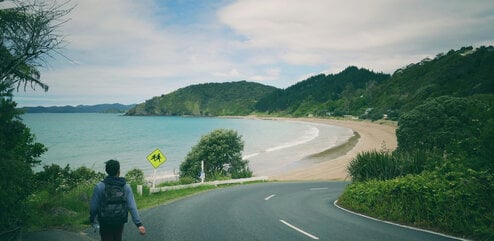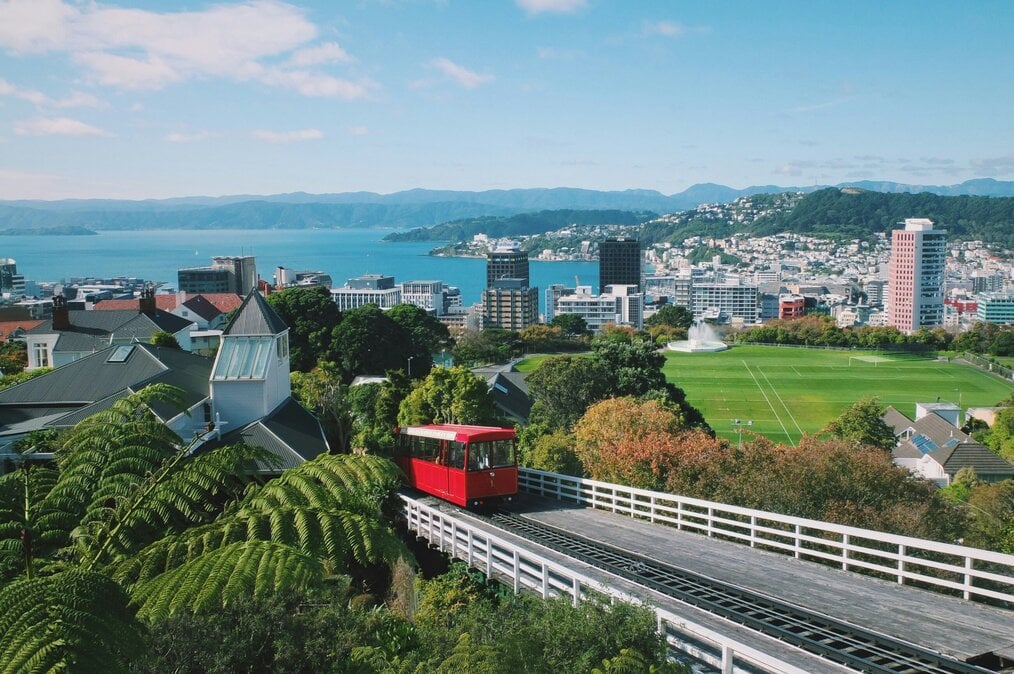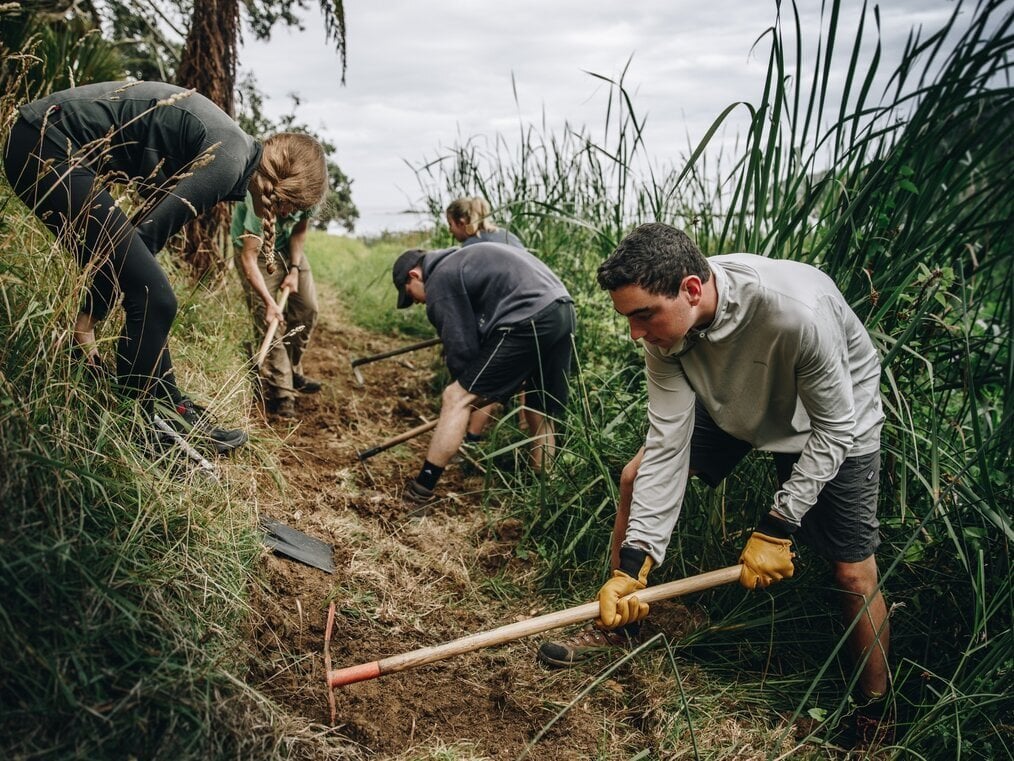
How to Get a Job in New Zealand as a Foreigner
Learn about how to get a job and move abroad to New Zealand with this helpful guide!
Regardless of whether you’ve traveled there before or have only seen its impressive landscapes through a screen, many people dream of getting a job and moving to New Zealand. But New Zealand is more than just picturesque hiking trails, sparkling lakes, and fresh mountain air. It’s a safe country with a great work-life balance, a universal healthcare system, and welcoming and diverse communities.
Interested in getting a job in New Zealand? Let’s break down the steps.
Is it hard to get a New Zealand work permit?
The ease of obtaining a work permit in New Zealand depends on your nationality, education, skills, and experience. There are several different visa options that cater to a range of situations including skilled workers in high-demand fields, recent graduates, young adults, and professionals in specialist roles.
1. Consider your visa options
There are several ways to get a job and move to New Zealand but before you jump into your employment search, you'll need to consider the legalities. Knowing what visa you qualify for is key to making your next move. Let's take a look at the options available to you in order to make your dream of getting a job and moving to New Zealand come true!
- Working Holiday Visa: If you're a US citizen under 30 years of age (or 35 for Canadian citizens) and want to divide your time in New Zealand between working and tourism then the New Zealand Working Holiday Visa is a great option! With this visa, you can apply for any job you’re qualified for.
- Skilled Migrant Category Resident Visa: This visa is granted on a points-based system. You must have a job offer from an accredited employer and a minimum of 6 points. If you have no prior work experience in NZ, the only way to reach 6 points is through a doctoral degree, earning at least 3x the median wage ($94.83 NZD an hour/$54.21 USD an hour) at your current job, or meeting the requirements for professional registration in select fields (ex. surgeon, psychologist, accountant, engineer, nurse practitioner, certified plumber).
- Straight to Residence Visa: NZ’s Green List is a list of shortage occupations. If your job is on the list, you can apply for positions in New Zealand from abroad. Once you have an offer, you’re eligible to apply for a visa that leads directly to residency. Some of these Tier 1 roles can be found in healthcare, K-12 education, engineering, construction, social work & mental health, and architecture.
- Post Graduate Work Visa: If you’ve been interested in earning a degree, consider studying abroad in New Zealand. Undergrad and grad students can work up to 20 hours a week while in school. Once you graduate, you’ll be eligible to apply for a Post Study Work Visa. Students who complete a graduate degree can stay and work up to 3 years!
For a personalized look at your options, check out the New Zealand Immigration website.
2. Decide where you’d like to live

New Zealand may be small but it’s mighty! The country is divided into the North and South Islands, connected by plane or more commonly, a 3.5-hour ferry ride. While the climates differ between the two, both have a lot to offer. Some of the top places for working in New Zealand include:
- Auckland: As New Zealand’s largest city, Auckland has plenty to offer, both in terms of job opportunities and cultural events. Surrounded by two harbors in the north of the North Island, this is a great home base for people who love the outdoors.
- Christchurch: With a high demand for workers in healthcare, IT, construction, and tourism, Christchurch is a growing city attracting an increasing number of foreign workers. A good quality of life and affordable housing market are just a couple of reasons why it was named the Happiest City in New Zealand in 2024.
- Wellington: Regarded as the artsiest city in New Zealand, the capital Wellington is home to a thriving creative community. Many here have jobs in film, art, marketing, and cultural heritage making it a popular place for opportunities in the creative sector.
- Dunedin: If you want a smaller city with a close community, Dunedin is the place to be. It’s also home to the University of Otago and has a lively social scene – perfect for meeting new people.
- Queenstown: If you’re looking for jobs in hospitality, ecotourism, or agriculture, look no further than stunning Queenstown. On your free days, enjoy dramatic landscapes while taking advantage of the many outdoor activities and adventure sports.
If you’re flexible and happy to go where the wind blows you, simply focus on where the job market is strongest for your field!
3. Research the job market
New grads and seasoned professionals alike should do some digging into the local job market. Your research can start by looking into the following questions:
- Are there worker shortages in certain fields?
- What kind of work is in demand?
- Where do your skills fit?
- Will you need to have your qualifications evaluated?
- What are the average salaries and how do they compare to the cost of living?
Licensed and credentialed professionals should check for any professional reciprocity that could exist in their fields. For example, architects, accountants, librarians, engineers, health professionals (including doctors, nurses, and occupational therapists), and veterinarians from the US have an easy path to getting their licenses and degrees recognized in New Zealand. This isn’t the full list so if you don’t see your profession, head to Google and start your search!
4. Revamp your resume/CV
In New Zealand, a resume is generally called a CV which is short for Curriculum Vitae. Employers look for similar types of things on CVs as they do in the US or UK but you’ll still want to update your resume so that it’s NZ-friendly.
- It's generally uncommon to include a headshot of yourself on your CV
- Keep it short and to the point
- Be confident and thorough but don't boast about your accomplishments
- Include basic information like location, number of employers, and a website for any employers from outside of New Zealand
- Most employers ask for the contact details for two references so be sure to let your referees know ahead of time that you're listing them
For free CV and cover letter templates, check out the New Zealand government's career website.
5. Search and apply for jobs

Unless you’re already in the country legally, most visas require you to have a job offer in hand from an employer in New Zealand before you apply. Common websites to find a job in New Zealand include:
If you’re a professional in an in-demand field, you can look for jobs through industry-specific career sites. Here are some of the most popular options.
If you've secured a Working Holiday Visa, you’ll most likely want to wait until you're in the country to look for work. Seasonal jobs and positions in the service and retail industries are best applied for in person.
Better yet, if you choose a Working Holiday Visa Program like Global Work & Travel or Greenheart, you’ll not only receive assistance through the visa process but you’ll have help landing a job! Skip the job search and focus on enjoying your adventure!
Don’t forget to check the GO jobs board for new opportunities.
6. Prepare for the interview
The interview process may vary based on the industry but in general, for office-based roles, you can expect to be interviewed formally by a panel of 3-4 people. To make sure you’re adequately prepared, consider:
- Researching the company and preparing questions for the interviewers
- Practicing common interview questions and keeping answers detailed but succinct
- Picking an outfit that matches the level of formality of the job or company (ex. skip the suit for a job interview in the agriculture sector!)
Aim to arrive ten minutes early for your interview. If it’s a virtual interview, be sure to test your equipment well beforehand.
7. Apply for your visa
Each visa will require specific documentation. However, typically you will need to present the same core items for each.
- Copy of your passport
- Clean background check
- Medical clearance certificate
- Proof of English proficiency (through citizenship or a standardized test like IELTS)
Thankfully, New Zealand has streamlined its visa application system and accepts everything online. No need to travel to the local consulate!
Other options for moving to New Zealand

If you’ve gotten this far and realized you don’t qualify for any of the visas listed, don’t lose hope! There are still other options to move to New Zealand, some of which could lead to a job.
- Intern: Interning in New Zealand is a win-win. Even if you don’t end up with a job offer from your host, you’ll be building your resume and network.
- Volunteer: This option may not be paid, but if you want to get your foot in the door and gain valuable experience, volunteering in New Zealand is a good option. While in the country, network extensively and you might find an employer who wants to sponsor your visa!
- Digital nomad: Although not a long-term option, as of January 2025, tourists visiting the country can also do remote work. US citizens and citizens of other visa waiver countries can stay up to 3 months visa-free while UK citizens can stay for 6 months.
Say "kia ora" to New Zealand!
Whatever leads you to New Zealand, your time there is sure to be filled with outdoor adventures, welcoming locals, and tons of memorable experiences. Even though working in a different country can be a daunting prospect, the various visa options that the New Zealand government provides make it much easier to find a job and path that works for you! In no time at all you could be saying "kia ora" to New Zealand! Continue your research for your move to New Zealand with GO:






